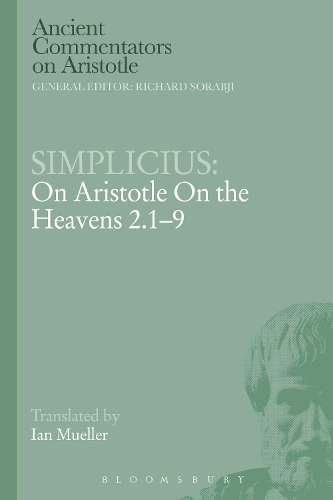
Simplicius: On Aristotle On the Heavens 2.1-9
(Paperback)
Available Formats
Hardback
Published: 27th January 2011
Hardback
Published: 24th February 2011
Hardback
Published: 1st November 2011
Paperback
Published: 26th March 2014
Paperback
Published: 26th March 2014
Paperback
Published: 26th March 2014
Paperback
Published: 26th March 2014
Paperback
Published: 26th March 2014
Paperback
Published: 26th March 2014
Paperback
Published: 26th March 2014
Paperback
Published: 26th March 2014
Paperback
Published: 26th March 2014
Paperback
Published: 26th March 2014
Publishing Details
Simplicius: On Aristotle On the Heavens 2.1-9
By (Author) Simplicius
Translated by Ian Mueller
Bloomsbury Publishing PLC
Bloomsbury Academic
26th March 2014
United Kingdom
Classifications
Tertiary Education
Non Fiction
Cosmology and the universe
Essays
113
Physical Properties
Paperback
256
Width 156mm, Height 234mm
340g
Description
Aristotle believed that the outermost stars are carried round us on a transparent sphere. There are directions in the universe and a preferred direction of rotation. The sun moon and planets are carried on different revolving spheres. The spheres and celestial bodies are composed of an everlasting fifth element, which has none of the ordinary contrary properties like heat and cold which could destroy it, but only the facility for uniform rotation. But this creates problems as to how the heavenly bodies create light, and, in the case of the sun, heat. The value of Simplicius' commentary on On the Heavens 2,1-9 lies both in its preservation of the lost comments of Alexander and in Simplicius' controversy with him. The two of them discuss not only the problem mentioned, but also whether soul and nature move the spheres as two distinct forces or as one. Alexander appears to have simplified Aristotle's system of 55 spheres down to seven, and some hints may be gleaned as to whether, simplifying further, he thinks there are seven ultimate movers, or only one.
Author Bio
Ian Mueller is Emeritus Professor of Philosophy, University of Chicago, USA
